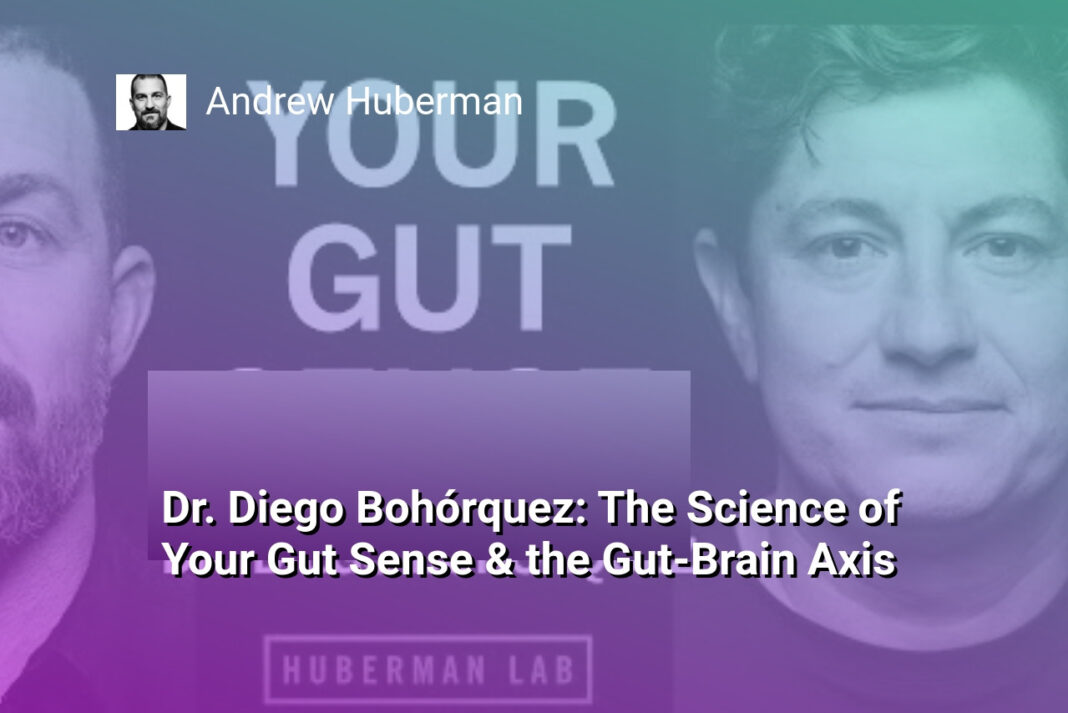The Bottom Line:
- The gut-brain axis refers to the direct communication between the gut and the brain, beyond just hormonal signaling.
- The gut contains sensory cells that can detect various components of food and the external environment, and quickly communicate this information to the brain.
- This gut sensing ability allows the gut to provide the brain with a clear picture of the types and qualities of food being ingested, which can then influence our thinking, emotions, and behaviors.
- The combination of Dr. Borquez’s expertise in gastrointestinal physiology, nutrition, and neuroscience allows him to provide unique insights into how different foods and food combinations can impact our overall feelings of safety, excitement, depression, or happiness.
- Dr. Borquez’s upbringing in the Amazon jungle has also influenced his scientific understanding and intuition about the connections between plants, nutrition, and their effects on the gut-brain axis.
The Gut-Brain Axis: Understanding the Connection
Uncovering the Gut’s Sensory Abilities
The gut is not merely a passive digestive organ, but rather an intricate sensory system that actively communicates with the brain. Contrary to the traditional view of the gut-brain axis being solely hormone-driven, recent research has unveiled a more direct line of communication between the two. The gut is equipped with specialized sensory cells that can detect various aspects of the external environment, including the composition, temperature, and acidity of the food we consume.
The Gut’s Neurological Connections
These gut-based sensory cells are connected to the brain through a complex network of nerves, known as the enteric nervous system. This system is often referred to as the “second brain” due to its intricate wiring and ability to function independently, to some extent, from the central nervous system. The information gathered by the gut’s sensory cells is rapidly transmitted to the brain, allowing for a real-time assessment of the gut’s internal state and the composition of the ingested food.
The Gut’s Impact on Cognition and Emotion
The constant flow of information from the gut to the brain has a profound impact on our cognitive and emotional states. The gut’s sensory inputs can influence our mood, cravings, and even decision-making processes. For example, the detection of certain nutrients or compounds in the gut can trigger neural pathways that elicit feelings of satiety, reward, or even anxiety, depending on the individual’s physiological and psychological state. Understanding the gut-brain axis is crucial for developing targeted interventions to improve overall well-being, from managing food cravings to addressing mood disorders.
Gut Sensing: Decoding the Language of the Gut
Unveiling the Gut’s Sensory Capabilities
Our gut is far more than just a digestive organ – it is a complex network of sensory cells and neural circuits that constantly monitor the internal environment and communicate this information to the brain. This intricate gut-brain communication is the foundation of what we call the “gut sense” or “gut feeling.”
Sensing the Composition of Food
The gut is equipped with specialized receptors that can detect the various components of the food we consume, including amino acids, fats, sugars, and even the temperature and acidity of the contents. These receptors relay this information to the brain, allowing us to subconsciously perceive the qualities of the food we ingest. This gut-derived sensory input plays a crucial role in shaping our food preferences, cravings, and overall feelings of well-being or discomfort.
Gut-Brain Signaling Pathways
The gut-brain axis is a bidirectional communication network, with the gut sending signals to the brain and the brain, in turn, influencing gut function. This intricate interplay involves a complex web of neural, hormonal, and immune pathways. By decoding these gut-derived signals, researchers are unraveling how the gut can impact our emotions, cognition, and even our sense of safety and security.
Through this gut-brain dialogue, the gut can modulate our mood, stress response, and even our propensity for certain behaviors. Understanding the mechanisms underlying this gut sensing ability holds the promise of unlocking new therapeutic avenues for a wide range of neurological and psychiatric conditions.
The Impact of Food on Mood and Behavior
Exploring the Impact of Food on Mood and Behavior
The food we consume has a profound impact on our mood and overall behavior. The gut-brain axis, a bidirectional communication network between the gastrointestinal system and the central nervous system, plays a crucial role in this relationship. Certain nutrients and compounds found in our diet can directly influence the production and regulation of neurotransmitters, hormones, and other signaling molecules that shape our emotional and cognitive states.
The Gut-Brain Connection
The gut is equipped with a vast network of neurons, known as the enteric nervous system, which can independently process information and communicate with the brain. This intricate connection allows the gut to send signals to the brain, informing it about the presence, type, and quality of the food we consume. The brain, in turn, can influence the gut’s function, affecting factors such as digestion, nutrient absorption, and the production of gut-derived molecules.
Dietary Impacts on Mood and Behavior
The specific nutrients and compounds in our food can have a significant impact on our mood and behavior. For instance, amino acids like tryptophan and tyrosine are precursors to the neurotransmitters serotonin and dopamine, respectively, which are closely linked to our feelings of well-being, pleasure, and motivation. Similarly, omega-3 fatty acids, found in foods like fatty fish, have been associated with reduced risk of depression and improved cognitive function.
Conversely, a diet high in processed foods, refined carbohydrates, and unhealthy fats can contribute to inflammation, oxidative stress, and imbalances in gut microbiota, all of which have been linked to the development of mood disorders and behavioral changes. The gut-brain axis is a complex and dynamic system, and understanding how specific dietary patterns and individual nutrients can influence this connection is an area of active research.
By recognizing the profound impact that food has on our mood and behavior, we can make more informed choices about our dietary habits and potentially improve our overall mental and emotional well-being.
The Extraordinary Story of Dr. Borquez’s Upbringing
Exploring Dr. Borquez’s Roots in the Amazon Jungle
Dr. Borquez’s upbringing in the Amazon jungle played a pivotal role in shaping his remarkable scientific journey. Born and raised in a remote region of the Amazon, he was immersed in a world of lush biodiversity and indigenous knowledge from a young age. This unique environment fostered his deep fascination with the intricate connections between the natural world and the human body.
Uncovering the Secrets of Medicinal Plants
As a child, Dr. Borquez spent countless hours exploring the Amazon rainforest, learning from the indigenous communities about the medicinal properties of the diverse plant life. He developed an intuitive understanding of how certain plants could be used to treat various ailments, a knowledge that would later inform his scientific work. This early exposure to the power of natural remedies instilled in him a profound respect for the wisdom of traditional healing practices.
The Influence of Indigenous Wisdom
Dr. Borquez’s upbringing in the Amazon jungle not only shaped his scientific curiosity but also his approach to research. He recognized the value of blending scientific inquiry with the traditional knowledge of indigenous communities. This holistic perspective has allowed him to uncover insights that may have been missed by a more conventional, Western-centric approach to science. His ability to bridge the gap between ancient wisdom and modern scientific understanding has been a hallmark of his groundbreaking work in the field of gut-brain axis research.
Tapping into the Power of Gut Intuition
Harnessing the Power of Intuitive Gut Signals
Our gut is far more than just a digestive organ – it is a complex sensory system that constantly monitors the internal and external environment, and relays this vital information to the brain. This gut-brain communication is not just about hormones, but also involves a direct neural pathway that allows our gut to rapidly and intuitively sense and respond to various stimuli.
The Gut’s Sixth Sense
Just as we have specialized sensory cells in our eyes, ears, and skin that allow us to perceive light, sound, and touch, the gut is equipped with a network of specialized cells that can detect a wide range of chemical, physical, and even emotional cues. These gut sensors respond to the composition of our food, the temperature and acidity of the gut, the presence of beneficial or harmful compounds, and even subtle changes in our emotional state. By constantly feeding this information to the brain, the gut helps us intuitively “sense” what is happening inside our body and make decisions accordingly.
Tapping into Gut Intuition
This gut-brain connection is the foundation of our “gut feelings” – those intuitive hunches or instinctive responses that often guide our decision-making and behavior. When we listen to and trust these gut-derived signals, we can tap into a powerful source of wisdom and self-knowledge that goes beyond conscious reasoning. By learning to attune to the subtle cues from our gut, we can make more informed choices about the foods we eat, the activities we engage in, and the relationships we cultivate – all of which can have a profound impact on our overall health and well-being.





